#21st century glam
Text
Electric Flare Issue Two
#hair metal#classic rock#80s rock#80s glam#80s#rock n roll#rock and roll#rock n roll music#glam rock#Dezzy Foxx#Pageant Band#Dixie Dragster#Stacy Lace#Eternal Sleaze band#21st century glam#dokken#kix#poison band#faster pussycat#motley crue
0 notes
Text
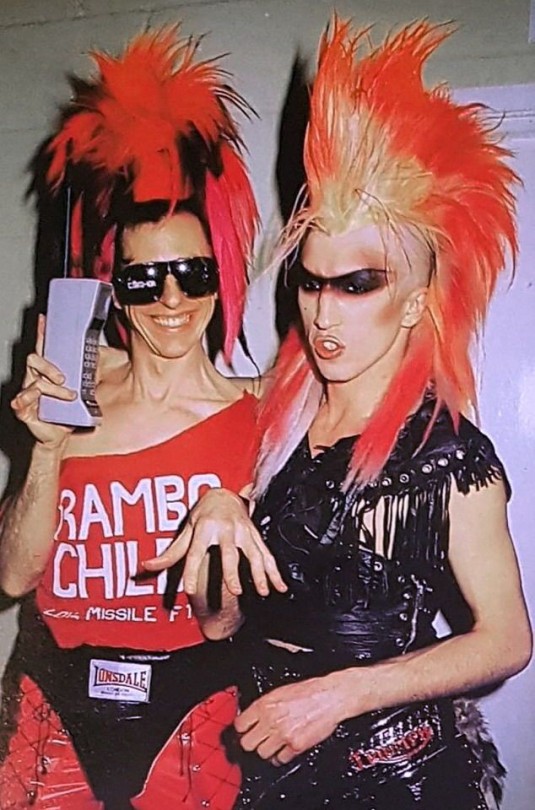

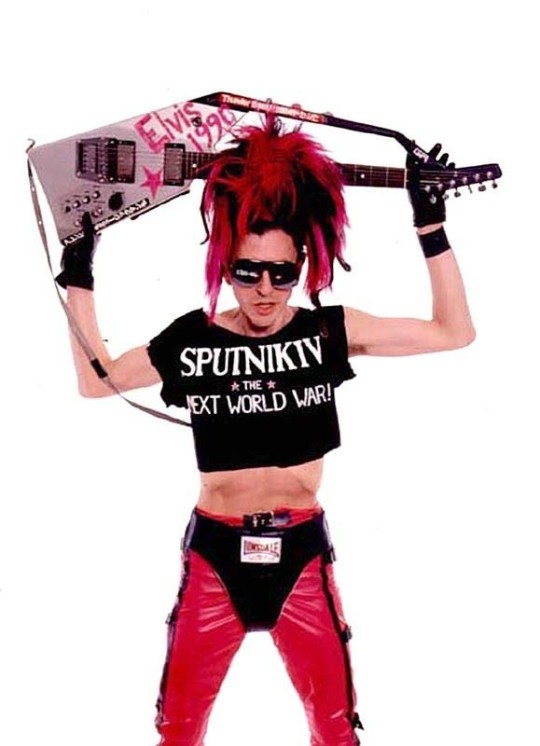

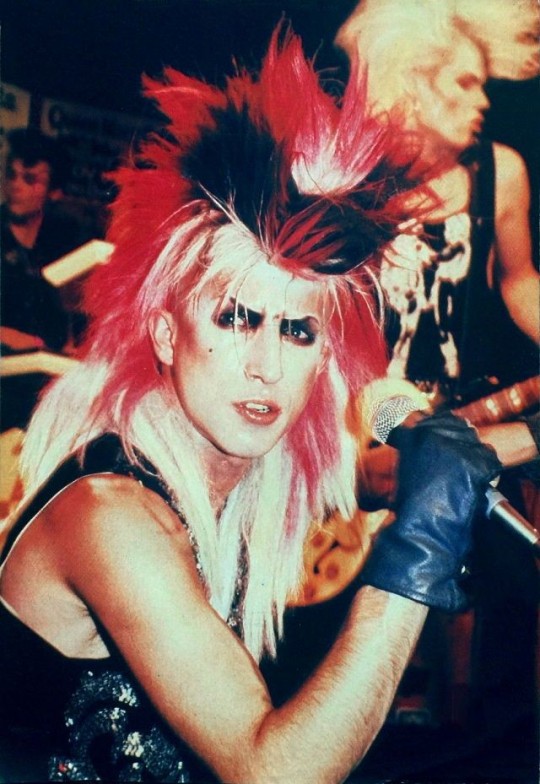
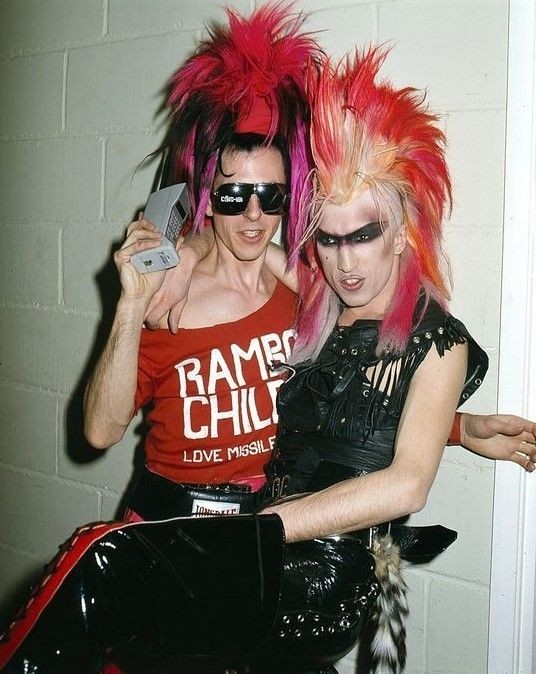




#sigue sigue sputnik#tony james#martin degville#glam punk#80s glam punk#rm magazine#cyberpunk#cyberpunk fashion#21st century boy#80s punk#80s hair#80s fashion#80s make up#hi NRG#new wave#synth pop#post punk#electronic#80s glam punk make up#80s glam punk hair#80s glam punk fashion#80s punk hair#80s punk fashion#80s punk make up
15 notes
·
View notes
Text
Heather Leather is only three years older than me. And she's living the dream. What the fuck.
3 notes
·
View notes
Text
guys guys i am accepting band recs pretty please
#im dying for more 21st century glam if anyone has anything and just modern hard rock/metal in general#also as always accepting 80s glam and classic rock recs roo#*too
6 notes
·
View notes
Text
you’re gonna be my toy
20th century boy
4 notes
·
View notes
Text
Alice Cooper: An Overview
I’ve recently created three iTunes playlists covering Alice Cooper’s career from 1969 to the present. The playlist is based on his studio discography. I’ll be meditating on my impressions of him as a long time fan — since the 70s — and my recent listening of his work.
I’ve divided up his career, and this playlist, into three rather uneven eras:
The first playlist covers the Alice Cooper Band…
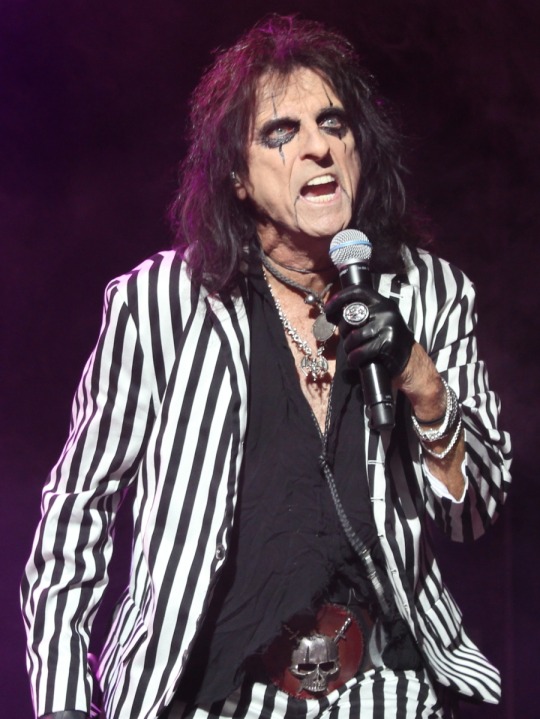
View On WordPress
#21st Century Rock#60s Rock#70s rock#80s rock#90s rock#Alice Cooper#Classic Rock#Glam#glam rock#Hard Rock#Heavy Metal#Metal#Music#Rock#Rock and Roll#rock music#Rock n Roll#shock rock
0 notes
Text
Interview from Metal Hammer 8/2023
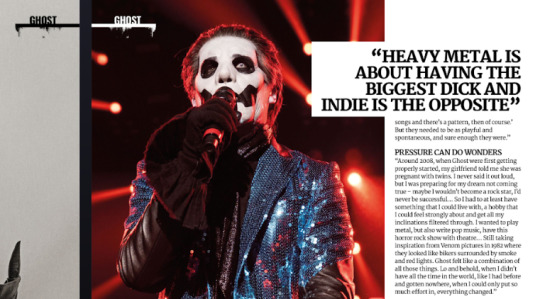
LIFE LESSONS from TOBIAS FORGE
Shock rock, bad glam bands and wanting to be Venom: inside the brain of Ghost's benevolent overlord
Tobias Forge is the mastermind behind one of the 21st century's hottest metal bands, but even he’ll admit that success was a long time in the making. Hailing from the Swedish city of Linköping, the Ghost frontman dabbled in everything from death metal to glam before donning the iconic Papal attire and paint to transform into Papa Emeritus, transcending his roots to become a larger-than-life character. Here are the key parables he has to share, gleaned from more than 25 years on the heavy metal frontlines.
MUSIC AND MOVIES ARE GATEWAYS TO OTHER WORLDS
“Linköping was a nice city to grow up in. It wasn’t so small you felt like you were cramped in a village, but it’s small enough that you’d still want to eventually move somewhere else. You’d have access to all these gateways to other worlds through the record stores and the local video store. My dreams started there - everything I do now, I dreamt back there.”
I WAS A TEENAGE HEADBANGER
“I had a teenage brother growing up, so I had a free pass into teenage culture. Whatever they consumed, I got a whiff of - how they dressed, what they watched on TV, what films they rented... The lifestyle and expression that meant most to me was shock rock. Twisted Sister were a wrecking ball into my life with I Wanna Rock. That song made me want to bounce!”
THE HEAVIER IT GOT, THE DEEPER I WANTED TO GO
“When I first heard Candlemass, I was eight and I was blown away. I already liked Black Sabbath, Metallica and Motorhead through my brother, but Candlemass were local and sounded so heavy, it was like doomsday. King Diamond and Candlemass served as a segue for me to discover death metal and black metal in the early 90s. It became my calling. From the ages of 12 to 22, I spent my life in death and black metal bands.”
FOLLOW YOUR HEART (AND SOMETIMES YOUR WALLET)
“My mom is from Stockholm, so when I was 15 and started saying I wanted to move there, she was just like ‘Finish mandatory school’ and we moved together [after I graduated]. I moved back to Linköping when I was 25, because Stockholm is a big metropolitan place and it’s not fun living in those places if you don’t have money. Now I’m in Stockholm again; it’s more fun now I can afford it!”
HEAD IN THE CLOUDS, FEET ON THE GROUND
“I learned the hard way in the late 90s that wanting to play 80s-inspired death metal with my band Repugnant was painfully out of touch with what was going on at the time. It broke my heart; I wanted us to be signed to Roadrunner and support Slayer. That never happened unfortunately - or perhaps fortunately, as it kept me grounded for a few more years and if those things had happened maybe I wouldn't be here today.”
TAKE CHANCES, BUT STAND YOUR GROUND
“Repugnant had a close shave with success. We signed to the label Hammerheart, which at the time felt like we’d made it because the first thing they did was take us out on our first tour, supporting the American band Macabre. They were a favourite band of ours - still are, and whenever we play Chicago they come to the shows - and at that point it felt like we might be going somewhere, but we quickly parted ways with Hammerheart because we couldn’t agree. It felt like our chance and we’d blown it.”
NOT ALL 80S BANDS WERE CREATED EQUAL
“With Crashdiet, we never really went beyond our home. I can’t say how many shows we did, but I don’t think it was more than a handful. For me especially there was conflict with the singer, Dave Lepard. We were friends, but he clearly wanted to take his band into some sort of glam-sleaze direction, whereas when I think of ‘glam’ I’m more Hanoi Rocks and Guns N’ Roses - never, ever the other bands. I know Poison kinda came before a lot of the latecomers, but to me they were repellent. Dave wanted to go all neon and I wanted it so that if we were glam, we’d be Hanoi Rocks meets Lords Of The New Church or The Dead Boys. I don’t want to be fucking Stryper! Fuck that!”
THERE’S NO POINT TRYING TO FOLLOW FASHION
“It was a confusing time in the early 2000s – rock was all of a sudden in fashion because of bands like Franz Ferdinand and Kaiser Chiefs. Everyone was always looking for the next big rock band and in Sweden The Hives were huge, as were The Soundtrack Of Our Lives, The Hellacopters, Backyard Babies...so many rock bands! But there we were in Subvision, influenced by The Dead Boys, with a little-too-long hair, leather jackets, just a little too ‘metal’... yuck! You’re supposed to be more indie; heavy metal is about having the biggest dick and indie is the opposite.”
FIRST IMPRESSIONS REALLY DO COUNT
“I hated The Strokes when they first came out. Back then, everyone described them as being so natural, that they weren’t interested in being rock stars, and I was like, ‘No. They didn’t wake up looking like that.' They chose to do that to be rock stars. And they can really play! Then when First Impressions Of Earth came out it was like, ‘There you go! That's what they really sound like! After that, I loved The Strokes, because they were showing they actually did love the music, but a lot of indie rockers treated it like it was their sell-out record.”
HAVE A VISION IN MIND
“Ghost started with a song, Stand By Him, which ultimately came out on our first record. I wrote it spontaneously, as an experiment - almost a joke, if you will, in 2006. When I recorded it the first time, I had no equipment in my home, so I had to go to a friend’s house. We did this very rough demo. He said it was great. He’d been in Subvision, Repugnant and Crashdiet with me, but we’d stopped playing together. He was like, ‘Can we form a new band?’ and I was like, ‘This song is the only thing I have. If I can come up with two more songs and there’s a pattern, then of course.’ But they needed to be as playful and spontaneous, and sure enough they were.”
PRESSURE CAN DO WONDERS
“Around 2008, when Ghost were first getting properly started, my girlfriend told me she was pregnant with twins. I never said it out loud, but I was preparing for my dream not coming true - maybe I wouldn’t become a rock star, I’d never be successful... So I had to at least have something that I could live with, a hobby that I could feel strongly about and get all my inclinations filtered through. I wanted to play metal, but also write pop music, have this horror rock show with theatre... Still taking inspiration from Venom pictures in 1982 where they looked like bikers surrounded by smoke and red lights. Ghost felt like a combination of all those things. Lo and behold, when I didn’t have all the time in the world, like I had before and gotten nowhere, when I could only put so much effort in, everything changed.”
THE MYTHOS IS NICE, BUT ONLY THE MUSIC MATTERS
“It was so weird, being threatened with a ‘reveal’ [Tobias’s public identity was revealed after ex-members took legal action against him in 2017I, as if people knowing who I was would be such a turn-off that they’d never listen to Ghost again. Here I am, most of my life wanting to be known, but then I was fighting to be unknown? What a paradox!”
ROLL WITH THE PUNCHES
“I’ve always tried to be like a general – have a goal, like, ‘Let’s take that castle’, but knowing that things can change in the field. You need to conduct yourself with a certain level of elasticity. I know I’m a control freak and want things to be done in a certain way, but I’m also aware things never work out that way.”
CHALLENGE YOURSELF
“One of the biggest weaknesses with modern metal - and horror - is that it’s being created and curated by people who only like that thing, so it becomes regurgitation. The best horror movies I’ve seen - Jaws, Bram Stoker’s Dracula, The Exorcist, The Omen - were made by people who never made horror films elsewhere. They wouldn’t limit themselves. If you don’t like other things, that’s fine, but if you ever feel stuck creatively it might just be that you’re sticking too close to home. I can’t even imagine just sticking to one lane these days.”
743 notes
·
View notes
Text
opinions on angel dust...
overall critique: angel dust feels less like a gay gangster from the 40s and much more like a modern-day drag queen. he's p much just alaska thunderfuck with a new yorker accent. (yes i know viv listed alaska as an influence, i'm just saying there's *so* much of the alaska vibes that i hardly see any 40s gangster vibes)
specific ramble of today: the glitz and glam associated and portrayed with angel dust is much more burlesque/cabaret-adjacent, with aesthetics that are more associated with the 70s-90s, and everything sensationalized about its aesthetics in pop-culture after.
pole dancing itself didn't start to get popularized or utilized the way we know it until the 50s, and even then it's so glitzed and glammed up in angel's portrayals that it reads more like a rupaul's drag race superstar performance than anything else. he also doesn't really feel like he's from the 40s to me. he feels much more like a young but traumatized 20-something from a more recent decade.
and yes if he died in the 40s then he's been in hell for a long time where he'd've been introduced to these more modern things, but that kinda brings up another question of how are hell's aesthetics influenced, if at all, by the modern-day culture on earth? has hell just always existed with the modernism of the 21st century or does it align with earth's culture, and for that matter which part of earth's culture, only america?
TL;DR: i think angel dust would be a stronger character if viv just ditched the 40s gangster bit altogether and had him be a 20- or 30-something drag queen from new york sometime around the 80s-90s (when there was an active drag scene, and there was also drug-use in the clubs which would also play into his character). it makes his aesthetics make more sense, plays into his story, keeps his accent everyone loves, and he would still have been existing in hell for multiple decades prior to the present day.
#vivziepop critical#spindlehorse critical#hazbin hotel critical#hazbin hotel angel dust#rambles#thoughts
77 notes
·
View notes
Text
Unique and gorgeous songstress...Elusive chanteuse...Fair-faced diva to the transgender masses...The 21st century's definitive glam rockette...& so on & so on
162 notes
·
View notes
Text

“The Edinburgh sisters had such a great fashion sense. Like even now, in the 21st century, that i look at their photos, they exhibit class and glam. They really were such powerhouse fashion icons.” - Submitted by Anonymous
#queen marie of romania#princess victoria melita#Princess Alexandra of Saxe Coburg and Gotha#Princess Beatrice of Saxe Coburg and Gotha
26 notes
·
View notes
Text
Overly long musings about a potential characterisation of Fem!England that doesn't match what would be canon nor should it necessarily be canon but I think would be neat here we go...
Don't get me wrong I do enjoy Fem!England's design - particularly as she's just as scrawny and thin as Arthur but I kind of want an aesthetic that's less skinny child and more emaciated and hollowed out adult.
The kind of woman who smoked excessively and had an opioid addiction throughout the 19th century not entirely of her own making (laudanum and how it could just keep spiralling from there) that she still struggles to shake through to the 21st.
The kind of woman whose hair is a dark wild curly crows nest which never reached Gibson Girl level of dishevelled glam no no it's just a pre-raphaelite mess. That's what I view her as - if Arthur's a punk delinquent then she's that tragic Victorian waif seen in so many operas and plays.
She is certainly someone who would fit right in with 80s punk or 90s grunge no problem (she certainly buys into the lifestyle), but she's someone who used to stand at the end of the hallway in a white gown holding one candle and make Alfred squeak as he snuck upstairs after drinking a midnight milk snack because she truly is as ephemeral and as solid as a ghost (he didn't mean to have her thrown in the river in the 1690s - honest - he knows she's not a witch but when she looms like that...)
And even when she 'cleans up' she's just swallowed up by the sashes and dresses and jewellery. She doesn't hate wearing them but they sure do not enjoy being worn by her.
She stops wearing red after 1918. Green is safe and alive. White are her cliffs that protect her and the pearls that Caesar invaded her for. Red is... everything that is wrong with the world. Everything that she did wrong.
She's still got a stick up her arse, just like Arthur, she's still a menace for the rules until it serves her to break them, just like Arthur. That feeling of helplessness, passivity and apathy that churns and gives way to smug superiority as a front to hold herself together, just like Arthur, is forever present.
Unlike Arthur her anger is more internally directed and set to a permanent broil rather than lashing out at the smallest infraction at the closest recipient. It's a system which rots her from the inside out, but she's nothing but a martyr (still so much like Arthur) and thus she will endure.
Her disappointment and melancholia is more feared than her anger by her kids. She doesn't get angry at them. No no. That's not what mother's do. The kids - only in glimpses - catch their mother's erratic mood swings, unable to predict the pattern of when she'll take them strawberry picking and make jam for them or leave with them with a nanny and lock herself in the attic nursery for five weeks and spend it peeling off the yellow wallpaper - It's not that they doubt she cares for them, loves them even, it's just the fact that their mere presence sometimes makes her question things that it would be much easier to ignore.
So like. Her relationship with the colonies are arguably more fucked up than Arthur's ever could be. A genuine desire for motherhood that got conflated and wrecked by Empire so every moment like these:



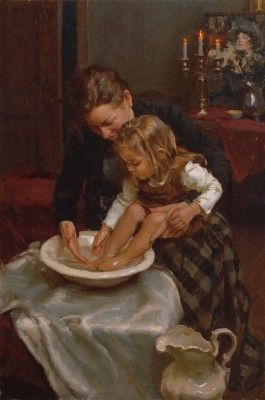
Feels like propaganda to her (because isn't it???) and it's to the point where she can't tell what's genuine anymore. In reality she would want nothing more than be that sort of soft mum but she's not. She can't be. Because it's selective on who she can show it too. Because it's encouraged by the wrong people. So she thinks, and broods, and the anger continues to bubble.
Sometimes she can live in the construct, tell herself she's playing pretend, only for it then to feel very real, too real, and she panics and refuses to play house and lie.
Except she's not sure if she was lying. Like was she just feeding into this motherland mother country white woman's burden bullshit or should she admit the equally scary option that what she feels for the kids is genuine? Only she can't express it without buying into said oppressive system and...
She's conflicted for about three hundred years.
...Hmm. I just think a female England would be quite an interesting vehicle to explore that intersectionality of gender and empire - making it worse in that it is a role she genuinely wants - being a mother - and even so she cannot express it in her own way because it seems to only be used by those who make it harmful. So it eats her from the inside out until you reach... idk. Say 1945? 1956? When her government admits the idea that she's the world's caretaker is a lie. When her eldest best beloved boy has come of age and her regency has ended.
She was shit at it anyway. So she tells herself. And now she'll never be a mother again; she'll never be given the chance or the right as she does not deserve it. The older children don't need or want her anymore (if they ever did to begin with and they did, when those times did feel real and her songs and embraces were sweet memories). But the desire still leaks out. Moments still occur. And despite everything she is still lady mother to a few, even if it's not a term spoken out loud. Sentimentality remains, and she can be incredibly sentimental when in one of her moods.
She's better now, essentially. Still half rotted. Still hollow. Still unsure of what her genuine self is and where that belongs. But at least she's not frightened of that love for her kids. At least her impulsively kissing Mattie on the temple doesn't send her into fits of madness anymore.
Small victories.
#hetalia#hws england#fem!england#headcanon#arthur's parenting#this appeals to... checks notes... ah. me.#hyup!#op#historical hetalia
101 notes
·
View notes
Text
Electric Flare Issue One
#80s glam#80s#rock n roll#classic rock#80s rock#hair metal#reckless messiah#sleazy sweet#21st century glam#kiss band#dokken
0 notes
Text
hope I live long enough to see an era where historical/fantasy writers are constantly reminding the audience that the female characters are wearing bras and they're really uncomfortable and they can barely breathe or move in them and they're constantly aware of them and have to base their entire physicality around dealing with them because a cruel 21st century partriarchy forces all women to have full glam pushed up boobs 24/7
5 notes
·
View notes
Note
roots: Is your OC's look inspired by any specific style of clothing or fashion trend? What are the roots and/or inspiration for their look?
[ either OC! ]
˚ʚ♡ɞ˚ Thank you so much for the ask! ˚ʚ♡ɞ˚
I’ve low key always wanted to answer this about Cyfrenne, so I am so glad you asked it hahah c’:
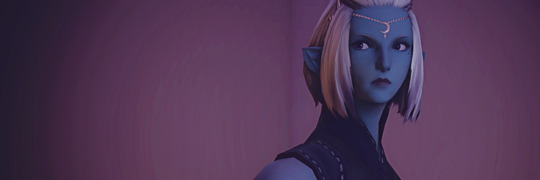
In my brain, I take a lot of inspiration from my favourite Haute Couture designers when I’m imagining how Ren looks, (which is why you see so many pretty dresses on this blog lol) designers like Zuhair Murad, Ellie Saab, Schiaparelli and Iris Van Herpen, who for me, all capture that necessary balance between powerful and delicate in their Couture designs. There's plenty of embellishment and detail that evokes the historical aesthetic that inspires modern Haute Couture (Rococo) but it's streamlined to fit in with the 21st Century.
Please enjoy some examples c’:

I think this balancing act between those two dichotomies is really evocative of how I envision Cyfrenne as a character too! There are lots of things about Ren which give her power over other people. Her wealth, her education, even her current occupation; being in charge of a collection – as the archivist and curator, she gets to decide what’s available and to whom! She’s well aware of the breadth of her influence and what doors it can open for her. But at the same time, she’s very delicate emotionally; she’s paranoid and needy and petty and unsure of herself. She craves other people’s validation far too much and so sometimes her boldness and bravado can approach poor taste. (You can say that last part about Haute Couture too c’: )
Of course, it’s a bit hard to translate Murad and Schiaparelli into the items we have in game, and so when I am creating outfits for Ren I try really hard to marry that aesthetic of powerful and delicate with what’s available to me. Most of Ren’s canon glams include high boots and I try to put together outfits which accentuate her neckline (even tho Elezen necks are really long already lol) because Haute Fashion designs are whole pieces, from head to toe, and that’s why they rely on their drape on a tall frame with excellent posture to carry them properly. I also spend a lot of time messing around with gloves, rings and jewellery to try and add a suitable amount of bling bling to evoke the feel of luxury that Coture designs evoke.
#oc ask meme#oc answers#ren#thank you so much again!#it was so fun to answer!#i will use any excuse to post more pictures of pretty dresses c':#Asks and answers
15 notes
·
View notes
Text
scandalous icon: david bowie - an analysis
“I always had a repulsive need to be something more than human.” - David Bowie
Spoken like a person with such power-hungry and ambitious signs such as a Capricorn sun and Leo moon. He was the self-described “tasteful thief” who appropriated from and influenced glam rock, soul, disco, new wave, punk rock and haute couture, and whose edgy alter egos invited fans to explore their own dark places. He was a person of relentless movement. He was an innovative, visionary, restless artist. His theatrical flare, creativity, sexual ambiguity, and incredible music kept the public endlessly interested. He was inducted into the Rock and Roll Hall of Fame in 1996. Rolling Stone ranked him among the greatest artists in history. As of 2022, he was the best-selling vinyl artist of the 21st century. With his sylphlike body, chalk-white skin, jagged teeth and eyes that appeared to be two different colors, Mr. Bowie combined sexual energy with fluid dance moves and a theatrical charisma that mesmerized male and female admirers alike. He was complex, an explorer of human impulses that could not be quantified. He was the infinitely changeable, fiercely forward-looking songwriter who taught generations of musicians about the power of reinvention. Throughout his career, he reinvented not just his sound but his persona over and over again; his best known persona was the flamboyant, androgynous, orange-haired glam rock alien alter ego Ziggy Stardust.
Beginning life as a dissident folk-rock spaceman, his ascent was measured rather than rapid, but once his album Ziggy Stardust And The Spiders From Mars got their claws into the British rock scene, he soared like a supernova, going on to sell over 150 million albums, receive countless accolades, and become a beacon of light for those embracing their sexuality (not least of all those in the LGBT community). He went on to embrace other personas after the demise of the band: a well-dressed, blue-eyed soul singer, a Nazi and fascist-influenced European (the Thin White Duke), a drug-loving art rocker (the Berlin trilogy), a new-wave hit-maker, a hard rocker, a techno enthusiast and a jazz impressionist. His ever-changing, outrageous personae served to mask the painful shyness and insecurity of his younger years. His flair for theatricality won him a legion of fans. His fickleness cost him relationships, friendships and professional partnerships, could be jarring. Members of the Spiders From Mars, his band during his glitter-rock Ziggy Stardust years, learned that they were being fired when he announced it onstage at the end of a 1973 tour. Through it all, David Bowie has definitely always been his own special creation. And it all began for him so long ago when he was just a kid in South London, where he began the journey that, by dint of his genius, his persistence, and his sheer hard work, would transform him into a global icon whose name, image, music, and artistry would endure forever.
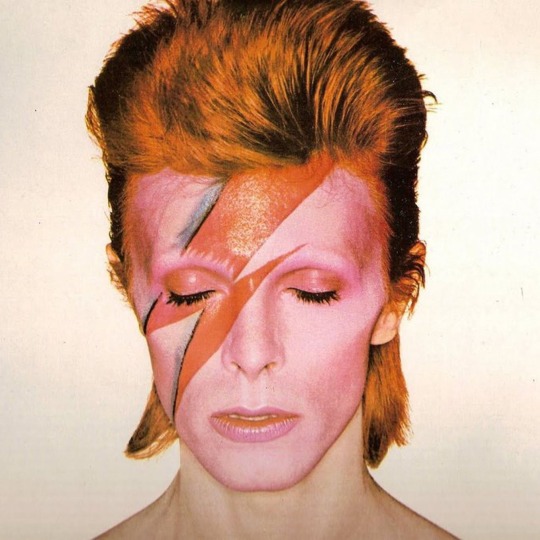
David Bowie, according to astrotheme, was a Capricorn sun and Leo moon. He was born David Robert Jones in South London, Brixton, England. His father, Haywood Stenton Jones, belonged to a well-off family who were partners in the Public Benefit Boot Company; his mother, Margaret Mary "Peggy" Jones worked as a waitress at a cinema. The mother of three illegitimate children (including David) at a time when a girl could have been ostracized by society for having even one, Peggy was never afraid to dance to a different drummer. The only child his parents had together, David was born left-handed, which in 1950s England was considered a disgrace, an aberration that had to be corrected at all costs. His schoolmates yelled that he was “the devil,” simply because he wrote with his left hand. Worse still, “the teacher used to smack my hand to try and make me right-handed,” he said. He showed an interest in music from an early age and began playing the saxophone at age 13. He was greatly influenced by his half-brother Terry, who was nine years older and exposed the young Jones to the worlds of rock music and beat literature. Terry was diagnosed with schizophrenia and institutionalized when David was a young man. David suffered another blow, this one quite literal, in a teenage brawl over a girl that caused his left pupil to be permanently dilated.
He attended a high school that would prepare him for a career as a commercial artist. After a few lessons on a plastic saxophone purchased on a payment plan, he began playing in local bands, finding that he liked singing and the female adulation that came with it. To avoid confusion with Davy Jones of the Monkees, he renamed himself after 19th-century American frontiersman Jim Bowie and the hunting knife associated with him. Fascinated by musical theater, David joined a mime troupe led by the dancer (and, briefly, his lover) Lindsay Kemp. By 20, he had spent time at a Buddhist monastery in Scotland and dabbled in theatrical troupes. Bowie met Angela Barnett in April 1969. They married within a year. Her impact on him was immediate, and her involvement in his career far-reaching. With 1969’s Space Oddity, whose dramatic title track told the story of ill-fated astronaut Major Tom, he had a hit. On the following year’s The Man Who Sold the World, he experimented with psychedelia, and in 1971, he fused pop-rock with art pretense and experimentalism with Hunky Dory, his first significant album. Angela and David had a son born during the recording of Hunky Dory, Duncan Zowie Haywood Jones.
After a period of experimentation, he re-emerged in 1972 during the glam rock era with his flamboyant and androgynous alter ego Ziggy Stardust. The character was spearheaded by the success of Bowie's single "Starman" and album The Rise and Fall of Ziggy Stardust and the Spiders from Mars, which won him widespread popularity. In 1975, Bowie's style shifted towards a sound he characterized as "plastic soul", initially alienating many of his UK fans but garnering him his first major US crossover success with the number-one single "Fame" and the album Young Americans. Extensive cocaine use made him jittery and paranoid, even as it enabled him to be creatively prolific. In 1976, Bowie starred in the cult film The Man Who Fell to Earth and released Station to Station. Seeking calm and anonymity, Bowie spent much of the late 1970s in West Berlin, where he again changed direction with the electronic-inflected album Low, the first of three collaborations with Brian Eno that came to be known as the "Berlin Trilogy". "Heroes" (1977) and Lodger (1979) followed; each album reached the UK top five and received lasting critical praise. These experimentations with ambient sound presaged the synthesizer-heavy music of the 1980s.
After nine years of marriage, Angie and David Bowie separated, and they divorced on February 8, 1980 in Switzerland. In the divorce settlement, she received £500,000, paid in installments, and a 10-year gagging clause. Not wanting to fight over custody, she left their son with David. Returning to live in New York City, Bowie began expanding his range as an actor. He played the lead in a stage production of "The Elephant Man", for which he received critical praise. Bowie regularly released albums through the 1980s and 1990s, although none approached the success of his previous output. He fell in love with Somalian supermodel Iman Abdulmajid, whom he married in 1992 and with whom he had a daughter, Alexandria Zahra Jones, in 2000. After suffering a heart attack backstage during a tour in 2004, he stopped producing albums or touring for nearly a decade, devoting himself to family life. In 2013, Bowie returned from a decade-long recording hiatus with The Next Day. He remained musically active until his death from liver cancer at his home in New York City. He died two days after both his 69th birthday and the release of his final album, Blackstar (2016).
This is a special birthday analysis for David Bowie. Happy birthday, you Capricorn god.

Stats
birthdate: January 8, 1947
major planets:
Sun: Capricorn
Moon: Leo
Rising: Aquarius
Mercury: Capricorn
Venus: Sagittarius
Mars: Capricorn
Midheaven: Sagittarius
Jupiter: Scorpio
Saturn: Leo
Uranus: Gemini
Neptune: Libra
Pluto: Leo
Overall personality snapshot: Deeply serious yet poetically playful, he may have been torn between the self-imposed responsibilities of his career and social ambitions, and his desire to make a splash and have fun. Both proud and humble, at times he couldn’t decide whether he was the greatest or the most inadequate person he knew. When he got his industrious and playful elements working together, however, the world had better watch out, for in his own steady yet compelling way he could be the embodiment of purposeful ambition. No matter what his job was, he was a born professional. With expertly designed flair, he wanted to shine for himself and to achieve for the world. His reputation mattered a lot to him, and when he knows he has earned his praise he savours it like nobody else. He didn’t really mean to be a snob, but he had a way of nonchalantly lording it over people. This is because his belief in herself and in what he felt he must do was so intense. As a man born with this combination he found his way to the top of his chosen mountain. His was a pairing of sunny high-summer and serious mid-winter, an adventurous, gutsy mix of tough-willed, dedicated service carried out with zest and pizzazz.
He had the charisma of a star yet he worked dutifully behind the scenes, laying the foundations and preparing the party. Then on the day, he made the perfect host or hostess, carrying out his duties with total self-possession and real style. An air of authority and immense professionalism surrounded all his endeavours. He would do whatever was necessary, no matter how hard, to produce a polished performance and a superb result. With a strong social conscience, a real sense of noblesse oblige and a desire to make the world a better place, he was drawn to politics or fund-raising; good works and charities flourished on his enthusiasm and dedication. Whatever he did, he was likely to end up being put in charge, which was just as well, for subordinate positions were not really his scene. At times when the sun was shining he may have protested at having work piled upon him, yet let anyone deprive him of his load and he would feel not only hurt but somehow lost and guilty. Not all his work was totally altruistic. There could be something of the gold-digger in him, constantly alert for opportunities, yet he didn’t expect any free lunches, even if he did enjoy getting the best for the least. He was someone who, to quote her fellow Capricorn/Leo, Jack London, ‘will settle for good pay, good grub and hard work rather than poor pay, poor grub and easy work’. He had pride and confidence in his own achievements and, yes, he thought he could try harder, but in the end, he didn't do so badly, really, did he?
He was tall and slim with good bone structure and clear, open and refined features. His eyes were extraordinary, helping to give him an electric or magnetic aura. His distinguishing feature was his hair, which was always chicly styled, whether long or short. His thought processes were methodical and on the conservative side. He was ambitious and shrewd, serious, practical and prudent, although he could also be narrow-minded, lacking in humour and too concerned with material status. His mind was rational, cool and calculating, and his memory and logic were very good. The Sagittarian qualities that he brought to his career were those of vision, energy, enthusiasm and an ability to organize others. He needed recognition, room to maneuver and a fair degree of authority. He sought meaning and fulfillment in his life through career status and recognition. When dealing with colleagues, he could place strong demands on them. He had boundless enthusiasm and big ideas coupled with high expectations of succeeding. He was also self-sufficient and broad-minded. His genuine pioneering spirit, positive outlook and large-scale personal ambitions led him right to the top. When dealing with colleagues, he could place strong demands on them. He could be an intensely emotional person with extremely strong physical desires. He tended to see himself as a desirable person to the opposite sex. He needed to be loved, but he could also be extremely suspicious of other people and their motives. He acted very cautiously until he was sure of situations and how other people felt. His perseverance was strong, but he needed to learn moderation and not to over-rate his abilities or capacity for doing things. He was interested in foreign names and places, and by anything mysterious.He was a reliable and loyal person. His will and sense of honour were strong and he was a great organizer. On the downside, his self-assuredness could become dogmatism and imperiousness. Conservatism may have affected his creativity, artistic values and love affairs. This expressed itself as self-imposed restrictions or as selfishness. He often felt inadequate, which created an insidious form of oppression over all his forms of expression. He could also take herself so seriously, that people think that he was older than his years.
He was part of a generation that was strongly interested in humanitarian ideals, new avenues of communication and progress in mechanical skills. As a member of this generation, he was able to bring original ideas to both his career and spare-time interests. Crises in thought and ideology arose because he looked beyond tradition and old attitudes towards new original and inventive ways of looking at things, such as music and sexuality. His active mind tended to need constant stimulation and his tastes could be quite fickle and difficult to satisfy. He belonged to a time of peace-loving idealism when the family unit and the way relationships were managed underwent great changes. He could be too idealistic and a little unrealistic when it came to matters of love, sex and romance. As a member of this generation, he needed to be motivated to make the most of his potential, because the line of least resistance appeared very attractive, especially when it involved pleasure-seeking. He embodied the Libra Neptune generation in the sense that he was a huge part of a time when beauty reappeared in fashion. He was part of a generation which was highlighted by the clash between authoritarianism and individualism. As a member of the Leo Plutonian generation, he wanted freedom in his relationships and demanded the loyalty of his friends as a right. As a member of this generation, he wanted power over his own life and was prepared to challenge established structures. He didn’t feel comfortable being dictated to, unless he in some way agreed to it beforehand. He was a part of excesses of the sixties and seventies. He was part of a generation that brought about a revolution in forms of entertainment, recreational activities and leisure time, as well as attitudes towards children. David’s sexual adventures—some partly cocaine-fueled, all ignited by his unbridled appetites and his propensity to cast a wide net, coupled with his unlimited opportunities—typified his generation’s newfound ability to live out their wildness.
Love/sex life: He was the most impulsive lover of this type and the one most likely to forget practicality and follow his instincts. This spontaneity, when combined with his strong physical drives, made him a tremendously exciting, adventurous and unpredictable sex partner. It also got him into more than his share of trouble. But acting in haste and repenting in leisure was not a problem for him. Like all Mars in Capricorn lovers, he rather liked repenting. What was lacking in his sexual nature was subtlety. He pursued his desire with such directness and determination that he could appear inconsiderate and crude and he didn’t control his relationships as much as he bullied people into seeing things his way. The good new is that he was so affectionate and generous a lover that he was easily forgiven his sins. The bad news is that this quick forgiveness only made him more likely to commit the same offense again and again (more on this in my David Bowie sexuality post on my members-only website).
minor asteroids and points:
North Node: Gemini
Lilith: Capricorn
Vertex: Virgo
Fortune: Leo
East Point: Aquarius
His North Node in Gemini dictated that he needed to prevent his idealism from influencing his thoughts to such a high degree. He needed to consciously develop a more clear-minded and analytical approach involving his thought processes. His Lilith in Capricorn ensured that he was dangerously attracted to women who had a scrappy plucky attitude hot-wired into their psyche. He liked a woman who needed to be in control and to be mistress of her own destiny, because her life was in the control of not-so-well-meaning others as a child. Her Vertex in Virgo, 7th house dictated that he wanted a union which would take one to ultimate salvation or spiritual initiation, based on a shared ideal of dedication and service. There was a fantasy of joining with someone who had unique psychic and/or healing powers and the focus is on the practical work which will make everything all right. He was always in a partnership of one kind or another (if only in his head), desperately seeking one, or decided that it wasn’t worth the risk since his expectations would never be met. There was a sense that he wasn’t really complete unless he was intimately involved with someone. On some levels there was an irrational fear of ending up alone. The dark side was that he could get highly self-righteous about acceptable modes of behaviour in interacting with others and thereby alienate the very people he longed for. His parental role model was less than secure in his subconscious perceptions, though it may have seemed fine on an external level.
His Part of Fortune in Leo and Part of Spirit in Aquarius dictated that his destiny led him to a prominent position in life as a leader of some sort. Fame and prestige brought him success and material rewards. Success came to him when he stepped forward into the spotlight. His soul’s purpose asked him to embrace unique and unconventional life experiences. He felt spiritual connections and the spark of the divine when there was a humanitarian benefit to his efforts. East Point in Aquarius dictated that he was more likely to identify with his uniqueness, his individuality and his feelings for justice and fair play. He may have enjoyed shocking others occasionally with unconventional behaviour, designed to prove that all rules can be broken. He may have been very unique and inventive or simply eccentric and strange. He may have been rebellious in a number of areas. He was likely to identify with his mind; he may have been a great rationalizer—able to intellectualize everything.
elemental dominance:
fire
earth
He was dynamic and passionate, with strong leadership ability. He generated enormous warmth and vibrancy. He was exciting to be around, because he was genuinely enthusiastic and usually friendly. However, he could either be harnessed into helpful energy or flame up and cause destruction. Confident and opinionated, he was fond of declarative statements such as “I will do this” or “It’s this way.” When out of control—usually because he was bored, or hadn’t been acknowledged—he was bossy, demanding, and even tyrannical. But at his best, his confidence and vision inspired others to conquer new territory in the world, in society, and in themselves. He was a practical, reliable man and could provide structure and protection. He was oriented toward practical experience and thought in terms of doing rather than thinking, feeling, or imagining. Could be materialistic, unimaginative, and resistant to change. But at his best, he provided the practical resources, analysis, and leadership to make dreams come true.
modality dominance:
fixed
He liked the challenge of managing existing routines with ever more efficiency, rather than starting new enterprises or finding new ways of doing things. He likely had trouble delegating duties and had a very hard time seeing other points of view; he tried to implement the human need to create stability and order in the wake of change.
house dominants:
7th
12th
10th
His attitude towards partnerships with other people was emphasized in hid life, whether on a personal or on a business level. It also revealed his marriage partner. It indicated how he dealt with other people and how his relationships with others affected him. Also had the propensity to attract enemies, and the effect that they had on his life was an issue. He had great interest in the unconscious, and indulged in a lot of hidden and secret affairs. His life was defined by seclusion and escapism. He had a certain mysticism and hidden sensitivity, as well as an intense need for privacy. His ambition in relation to the outside world, the identity he wished to achieve in regard to the community at large, and his career aspirations were all themes that were emphasized throughout his life. All matters outside the home, his public image and reputation were very important to his. His attitude to people in authority, and how he viewed the outside world, as well as the influence of his mother and his own attitude to her was highlighted.
planet dominants:
Venus
Moon
Sun
He was romantic, attractive and valued beauty, had an artistic instinct, and was sociable. He had an easy ability to create close personal relationships, for better or worse, and to form business partnerships. He was defined by his inner world; by his emotional reactions to situations, how emotions flowed through him, motivating and compelling him—or limiting him and holding him back. He held great capacity to become a part of the whole rather than attempting to master the parts. He wanted to become whatever it is that he sought. He had vitality and creativity, as well as a strong ego and was authoritarian and powerful. He likely had strong leadership qualities, he definitely knew who he was, and he had tremendous will. He met challenges and believed in expanding his life.
sign dominants:
Leo
Capricorn
Sagittarius
He loved being the center of attention and often surrounded herself with admirers. He had an innate dramatic sense, and life was definitely his stage. His flamboyance and personal magnetism extended to every facet of her life. He wanted to succeed and make an impact in every situation. As a Leo dominant, he was, at his best, optimistic, honorable, loyal, and ambitious. He was a serious-minded person who often seemed aloof and tightly in control of his emotions and his personal domain. Even as a youngster, there was a mature air about him, as if he was born with a profound core that few outsiders ever see. He was easily impressed by outward signs of success, but was interested less in money than in the power that money represents. He was a true worker—industrious, efficient, and disciplined. His innate common sense gave his the ability to plan ahead and to work out practical ways of approaching goals. More often than not, he succeeded at whatever he set out to do. He possessed a quiet dignity that was unmistakable. He sought the truth, expressed it as he saw it—and didn’t care if anyone else agreed with him. He saw the large picture of any issue and couldn’t be bothered with the mundane details. He was always outspoken and likely couldn’t understand why other people weren’t as candid. After all, what was there to hide?
Read more about him under the cut.
David Bowie was one of the most influential and prolific writers and performers of popular music, but he was much more than that; he was also an accomplished actor, a mime and an intellectual, as well as an art lover whose appreciation and knowledge of it had led to him amassing one of the biggest collections of 20th century art.
Born David Jones, he changed his name to Bowie in the 1960s, to avoid confusion with the then well-known Davy Jones (lead singer of The Monkees). The 1960s were not a happy period for Bowie, who remained a struggling artist, awaiting his breakthrough. He dabbled in many different styles of music (without commercial success), and other art forms such as acting, mime, painting, and play-writing. He finally achieved his commercial breakthrough in 1969 with the song "Space Oddity", which was released at the time of the moon landing. Despite the fact that the literal meaning of the lyrics relates to an astronaut who is lost in space, this song was used by the BBC in their coverage of the moon landing, and this helped it become such a success. The album, which followed "Space Oddity", and the two, which followed (one of which included the song "The Man Who Sold The World", covered by Lulu and Nirvana) failed to produce another hit single, and Bowie's career appeared to be in decline.
However, he made the first of many successful "comebacks" in 1972 with "Ziggy Stardust", a concept album about a space-age rock star. This album was followed by others in a similar vein, rock albums built around a central character and concerned with futuristic themes of Armageddon, gender dysfunction/confusion, as well as more contemporary themes such as the destructiveness of success and fame, and the dangers inherent in star worship. In the mid-1970s, Bowie was a heavy cocaine abuser and sometime heroin user.
In 1975, he changed tack. Musically, he released "Young Americans", a soul (or plastic soul as he later referred to it) album. This produced his first number one hit in the US, "Fame". He also appeared in his first major film, The Man Who Fell to Earth (1976). With a permanently-dilated pupil and skeletal frame, he certainly looked the part of an alien. The following year, he released "Station to Station," containing some of the material he had written for the soundtrack to this film (which was not used). As his drug problem heightened, his behavior became more erratic. Reports of his insanity started to appear, and he continued to waste away physically. He fled back to Europe, finally settling in Berlin, where he changed musical direction again and recorded three of the most influential albums of all time, an electronic trilogy with Brian Eno "Low, Heroes and Lodger". Towards the end of the 1970s, he finally kicked his drug habit, and recorded the album many of his fans consider his best, the Japanese-influenced "Scary Monsters". Around this time, he appeared in the title role of the Broadway drama The Elephant Man, and to considerable acclaim.
The next few years saw something of a drop-off in his musical output as his acting career flourished, culminating in his acclaimed performance in Merry Christmas Mr. Lawrence (1983). In 1983, he released "Let's Dance," an album which proved an unexpected massive commercial success, and produced his second #1 hit single in the United States. According to producer Nile Rodgers, the album was made in just 17 days and was "the easiest album" he'd ever made in his life. The tour which followed, "Serious Moonlight", was his most successful ever. Faced with this success on a massive scale, Bowie apparently attempted to "repeat the formula" in the next two albums, with less success (and to critical scorn). Finally, in the late 1980s, he turned his back on commercial success and his solo career, forming the hard rock band, Tin Machine, who had a deliberate limited appeal. By now, his acting career was in decline. After the comparative failure of Labyrinth (1986), the movie industry appears to have decided that Bowie was not a sufficient name to be a lead actor in a major movie, and since that date, most of his roles have been cameos or glorified cameos. Tin Machine toured extensively and released two albums, with little critical or commercial success.
In 1992, Bowie again changed direction and re-launched his solo career with "Black Tie White Noise", a wedding album inspired by his recent marriage to Iman. He released three albums to considerable critical acclaim and reasonable commercial success. In 1995, he renewed his working relationship with Brian Eno to record "Outside." After an initial hostile reaction from the critics, this album has now taken its place with his classic albums. In 2003, Bowie released an album entitled 'Reality.' The Reality Tour began in November 2003 and, after great commercial success, was extended into July 2004. In June 2004, Bowie suffered a heart attack and the tour did not finish its scheduled run.
After recovering, Bowie gave what turned out to be his final live performance in a three-song set with Alicia Keys at the Hammerstein Ballroom in New York in November 2006. He also returned to acting. He played Tesla in The Prestige (2006) and had a small cameo in the comedy Extras: David Bowie (2006) for fan Ricky Gervais. In 2007, he did a cartoon voice in SpongeBob SquarePants (1999) playing Lord Royal Highness. He had a brief cameo in the movie ''Bandslam'' released in 2009; after a ten year hiatus from recording, he released a new album called 'The Next Day', featuring a homage cover to his earlier work ''Heroes''. The music video of ''Stars are Out Tonight'' premiered on 25 February 2013. It consists of other songs like ''Where Are We Now?", "Valentine's Day", "Love is Lost", "The Next Day", etc.
In 2014, Bowie won British Male Solo Artist at the 2014 Brit Awards, 30 years since last winning it, and became the oldest ever Brit winner. Bowie wrote and recorded the opening title song to the television miniseries The Last Panthers (2015), which aired in November 2015. The theme used for The Last Panthers (2015) was also the title track for his January 2016 release, ''Blackstar" (released on 8 January 2016, Bowie's 69th birthday) was met with critical acclaim. Following Bowie's death two days later, on 10 January 2016, producer Tony Visconti revealed Bowie had planned the album to be his swan song, and a "parting gift" for his fans before his death. An EP, No Plan, was released on 8 January 2017, which would have been Bowie's 70th birthday. The day following his death, online viewing of Bowie's music skyrocketed, breaking the record for Vevo's most viewed artist in a single day.
On 15 January, "Blackstar" debuted at number one on the UK Albums Chart; nineteen of his albums were in the UK Top 100 Albums Chart, and thirteen singles were in the UK Top 100 Singles Chart. The song also debuted at #1 on album charts around the world, including Australia, France, Germany, Italy, New Zealand and the US Billboard 200. At the 59th Annual Grammy Awards, Bowie won all five nominated awards: Best Rock Performance; Best Alternative Music Album; Best Engineered Album, Non-Classical; Best Recording Package; and Best Rock Song. The wins marked Bowie's first ever in musical categories. David Bowie influenced the course of popular music several times and had an effect on several generations of musicians. (x)
21 notes
·
View notes
Text
2023 Year End List - #11

El Diablo En El Cuerpo - Álex Anwandter
Main Genres: Synth Pop, Dance Pop
A decent sampling of: Electro-Disco, Synth Funk, Electro Pop
Yet another entry on the list that I discovered this year while looking for records from outside the Anglosphere. And again, it's another artist from Latino-America.
I already said this in an old review, so I'm just gonna reiterate my stance briefly again - the 21st century 80s synth pop revivalism wave has been very hit or miss. And I'm mostly talking about the stuff that very clearly is actually paying homage to 80s music, not just any artist who happens to make bleeps and bloops.
But yeah, hit or miss. Some of it is frankly very dull and uninspired, and makes me wanna just put on some classic Depeche Mode or Strawberry Switchblade instead.
But when it hits, it hits hard, somehow managing to justify this ""trend"" that's been going on far too long to even be considered a trend anymore. Let's face it - the whole 80s synth pop / synth funk / sophistopop sound is here to stay forever, and I think that's for the best, even if occasionally I get a little exhausted from the over-saturation.
Anyways, moving on to the artist.
Álex Andwandter is a queer Chilean alternative pop artist and director based out of Santiago. He's collaborated with one of my own favourites, fellow Chilean indie/alt pop artist Javiera Mena (who makes a guest appearance on this record!). The dude has been active for over a decade now, so again, I'm a bit late to the party. Cut me some slack; I'm a gringo.
Álex himself sings in a bright, chipper, falsetto-y tenor full of sunshine and rainbows, sounding every bit as colourful as the classic synthesizer sounds that he incorporates into his music, though he also has a more dark and seductive register that he often injects into his steamier dance songs.
El Diablo En El Cuerpo ("The Devil in the Body"), his latest offering and my first introduction to his discography, is classic dancey, funky synth pop with a lot of sincerity and a few pinches of homoerotic mystique sprinkled in here and there. A very indulgent record for you to just lose yourself in the glitter and glam of it all. Basically, this is some utopian gay space shit (shout out to those who get the meme) and I am here for it.
Nothing could prepare me for the tantalizing and straight-up badass electro-disco thunderstorm that is "Qué piensas hacer sin mi amor?" ("What do you think you will do without my love?"). Anwandter channels Depeche Mode, Soft Cell, and Donna Summer all at once on this fierce juggernaut that's absolutely soaking with erotic tension. Puts me right in the middle of the dimmest, sweatiest fucking over-crowded dancefloor in some sleazy ass gay bar on a goth night at 1:00 am, and I'm too drunk to feel anything except the pounding pulse of the rhythm and the arousal of strangers rubbing up against me....ahem, is it hot in here? Anyways, eat your heart out Troye Sivan ("Rush" is great too, I'm mostly just memeing).
In contrast, the following track "Precipicio" ("Precipice") gives off a very 'classy' vibe - more cocktail dresses and glowing white LED dancefloors, less BDSM goth fetish gear and sweaty dankness. Some nice, sexy funky horns on this one that really brings the whole thing together. I also LIVE for Álex's sassy twink diva vibes all over this track; gets me almost as h-word as the previous track.
"Toda la noche" ("All Night") is anthemic synth funk that's giving a little bit of INXS. Groovy and life-affirming feel good shit that I would snort if I could. I want this to be the soundtrack of my own silly little 80s romance that's all about being young in the big city.
"Vamos de nuevo" ("Let's Go Again") is less of a nocturnal dancefloor number, and more something you might skip along to down the sidewalk on a sun shower summer's day with your hot pink Sony Walkman. Gorgeous upbeat vibraphone and detuned synth keys providing a backdrop for foolishly lovesick lyrics. My other favourite cut off the album, after the obvious one.
At the end of the day, the record is definitely a bit frontloaded, and it wears me out a little bit with its sixteen tracks in total. I understand this is probably meant to be the kind of record you play late at night when you're ready to get wasted and dance your heart out until you pass out; I just think it could be sequenced to have more of the outright bangers towards the end.
But putting that aside, this was my second favourite dance record in a very stacked year for dance records, and it's certainly my favourite on the more disco/house/funky/electro-y end of the spectrum. El Diablo En El Cuerpo is simple, hot, memorable fun with a lot of exquisite taste. I can't imagine anyone in my own life that I couldn't successfully recommend this album to. So go on, embrace your inner gay synth pop twink.
8/10
Highlights: "Qué piensas hacer sin mi amor?", "Vamos de nuevo", "Precipicio", "Toda la noche", "Tienes una idea muy antigua del amor", "prediciendo la runa", "Unx de nosotrxs (feat. Javiera Mena)"
#Alex Anwandter#Spanish Music#El Diablo En El Cuerpo#synth pop#electronic#dance pop#2023#year end list#aoty#aoty2023#queer music#album review#music review
2 notes
·
View notes